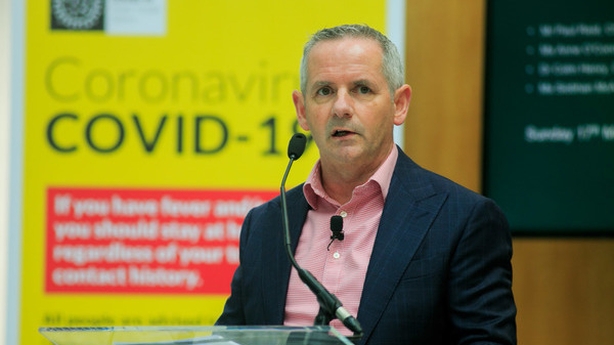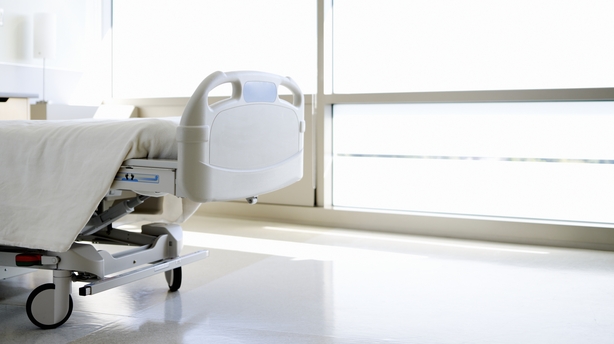The HSE has warned that the country is facing into a very important week, as Covid-19 restrictions begin to be eased and Phase One of the Government's road map gets under way.
Speaking at the HSE's weekly briefing on its response to the virus, HSE Chief Executive Paul Reid urged people to keep doing what they have been doing to keep the spread of the virus down.
The Department of Health this evening said it had been notified of 10 further deaths and 64 new confirmed cases.
It brings the total number of Covid-19 related deaths in the Republic of Ireland to 1,543, with a total of 24,112 confirmed cases.
Minister for Health Simon Harris has said the first phase of the reopening should be entered with "caution and care", and he said people must continue social distancing.
People should still stay at home except for the limited exemptions, he said.
He urged the public to "use our cop on as we go about things" as Covid-19 restrictions begin to be eased.
"If we do this and get the next three weeks right, we could be in a positive place and be able to move further. If we get it wrong, we will find ourselves in a bad place with many more people sick and many more losing their lives. We can't have that."
Meanwhile, Chief Medical Officer Dr Tony Holohan said the new behaviours we have all adopted to slow the spread of Covid-9 are now "even more important".
In a tweet posted this morning, Dr Holohan said that handwashing, respiratory hygiene and physical distancing are still key.
"If you have cold or flu like symptoms, even mild ones, isolate at home and call your GP. Do it today, Don't put it off," he said.
Mr Harris has said business owners who were permitted to open as part of Phase One of the easing of restrictions should make sure they were ready to open safely.
Tomorrow, the restrictions that have been in place since March will be eased slightly as efforts to reopen the country begin.
Certain businesses, such as garden centres and hardware stores, are preparing to open again.
People have been advised to wear face coverings in certain environments, such as on public transport and in enclosed indoor spaces.

From tomorrow, there will be automatic testing for all contacts of confirmed cases, and the HSE aims to have 90% of tests completed within three days.
Mr Reid said the coming week was a very important milestone, and thanked the public for their support and the sacrifices made.
He said everyone has a certain tolerance level when being told to be complaint with measures, but that if one thing has been proven, it is that what has been done so far has worked.
The worst thing people could do, he said, was change and go backwards.
HSE Chief Clinical Officer Dr Colm Henry warned that the rate at which the virus reproduces could also go up rapidly.
He said the effect of the easing of restrictions would not be seen for around seven days, and it could take a further seven days or so to clamp down on any rapid growth in numbers.
The HSE is aiming this week to have 90% of tests completed within three days.
It has also begun actively managing the contacts of confirmed cases for 14 days.
It says around 97% of those being tested at the moment are testing negative.
Read more:
At a glance: What restrictions are likely to be lifted and when?
Latest coronavirus stories

Hospital admissions and admissions to intensive care have also continued to fall.
However, health experts have warned that the easing of restrictions was likely to lead to some increase in cases and Minister Harris said the next three weeks would be crucial.
The Director of the National Virus Reference Laboratory, Dr Cillian de Gascun, said the fact that case numbers and the reproductive rate of the virus had been pushed so low gave much needed wriggle room to deal with an increase.
But he said it would be up to a week before we were able to see the effect of the easing of restrictions on the numbers and that would determine if we could move on to the next phase.
Elsewhere, the number of people in hospital with confirmed or suspected Covid-19 has continued to fall.
Last night, there were 634 people in the country's 29 acute hospitals of which 394 were confirmed cases, with 240 suspected cases of the virus.
This is down by 54 since Friday night, and down by more than 100 since last Sunday morning.
There were 54 patients with confirmed cases of Covid-19 in intensive care, and 15 patients with suspected cases. A week ago there were 72 confirmed cases in ICU and 22 suspected cases.
There were 1,246 general hospital beds available yesterday, and 151 vacant intensive care beds.
The hospital with the highest number of confirmed cases was the Mater Hospital in Dublin with 62, followed by Tallaght University Hospital with 55, and St James' Hospital with 52.
Outside of Dublin, Limerick had the highest number of cases, with 29 confirmed.






